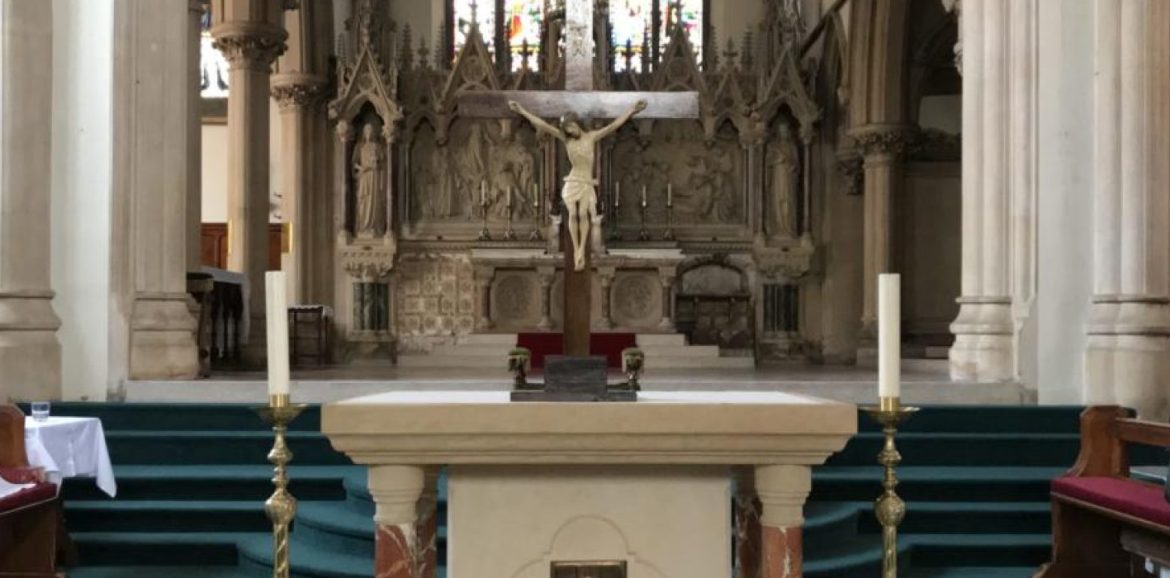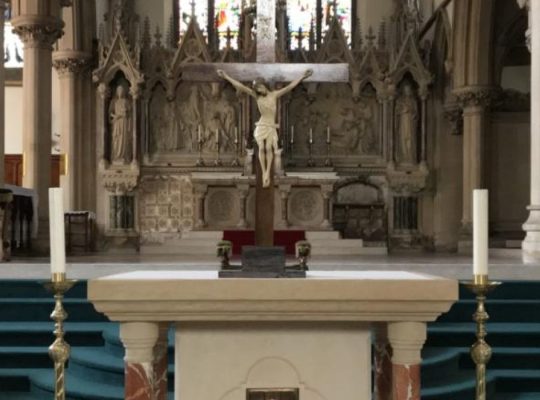Just a Thought
Throughout salvation history, we have always been, and always will be, between the two comings of the Lord. The time of Advent will only end with the last manifestation (called ‘eschaton’) of the one who has already come but for whom we nevertheless still wait. However, time is neither perpetually uniform nor indefinitely cyclical; one doesn’t travel in circles, but advances. Each day is unique, as is each era. Some things happen that create or modify rhythms, or start them up again, things that have a decisive character. In all these matters is the event of Jesus Christ, an event that brings about a new Advent—the final one—that cannot be modified in any way, and which fulfils the hope of those that precede it. Because of this, earlier cries of appeal take on a new ring, and are enriched with unforeseen harmonies.
The Liturgy of the Word for this Sunday opens with a prayer in the form of a Psalm. A prayer that is easy for the Christian assembly today to make its own, because this Psalm text is effectively situated between two comings of the Lord. ‘You, Lord, are our father, our redeemer you are named forever.’ We are used to naming God in this way, and we understand these titles in their truest sense.As in this first reading we call on God to intervene: ‘Oh, that you would tear the heavens open and come down…..’ Today during this Advent season, we cry out for the eschaton ‘Come Lord Jesus, Come.’ We dare to almost demand that he return: being reminded all the time as we are during the Lenten season that we must turn away from sin and return to God; standing tall, staying awake at all times, ready for the masters return. The audacity of this prayer is founded on the love of God for ‘his servants’ and ‘for the tribes that belong to him.’
With this dialogue between God and his people, the Gospel brings us back to our particular place in this world and to the manner in which we wait for the coming of the Lord. Mark repeats Matthew’s warning of the First Sunday of Advent in Year A: ‘Stay awake!’ and always for the same reason: ‘You do not know when the appointed time will come.’ But there is one difference between the two. Mark places the return of the Lord at night. This might not seem like a significant variation. The return of the Master will take place unexpectedly; that is what is essential. Whether it takes place during the day or the night matters nothing: a simple detail of the presentation. Is this in fact the case?
These days, most people can enter their homes at any time, whether daytime, evening, midnight, dawn, in spite of the dangers that exist in certain places. Such was not the case when Jesus recounted the parable of the watchful gamekeeper in today’s Gospel. To place the moment of the Master’s return at night is unusual and must have meaning.
A great deal of symbolism is attached to night in the Bible. While no-one can work during nighttime hours, nevertheless, that is the time when the powers of evil display their activity, it is then that the enemy sows weeds in the wheat field (Matt 13:24-30). As is seen throughout scripture, Night is the time of suffering and the threat of surprise attacks, the sorrowful time of waiting for the coming of the Son of Man. The term ‘night’ therefore, often—and quite naturally— has a negative connotation.
In the parable of the gatekeeper, night signifies the present time with all its ambiguity and tension: in itself it is dark, but those who are ‘sons of light,’ ‘sons of day, do not belong it. One should read the passage from the First Letter to the Thessalonians (5:1-6):
‘As regards specific times and moments, brothers, we do not need to write you; you know very well that the Day of the Lord is coming like a thief in the night. Just when people are saying, ‘Peace and security,’ ruin will fall on them with the suddenness of pains overtaking a woman in labour, and there will be no escape. You are not in the dark, brothers, that the day should catch you off guard, like a thief. No, all of you are children of light and of the day. We belong neither to darkness nor night; therefore, let us not be asleep like the rest, but awake and sober.’
Like everyone, Christians live in the night of this world, but they do not belong to it. They will not be surprised by the day that will come during this night; the light is within them and keeps them in a state of watchfulness. The season of Advent will serve as a reminder to ‘Stay awake.’
Nevertheless, the vigil between the departure of Jesus and his return is an ordeal in which Jesus, in praying for them, supported his disciples before leaving them. Hiding from them none of the difficulties and temptations they would have to face, he said to them: ‘I will not leave you orphans.’ He promised them ‘…Peace…. And the gift of the Spirit…… He will bear witness on my behalf. You must bear witness as well.’ Exactly the same is promised to us, exactly the same is given to us.
This Sunday sings and celebrates long term faith, the long delay in the expectation of the ‘good news of Jesus Christ, the Son of God,’ about whom Mark will tell us throughout this year. The Gospel of Jesus Christ, the Gospel that is Jesus Christ, is always a beginning that must ring forth in our memories in order to be revived in all its capacity for renewal and enthusiasm. The Gospel points to an event that ‘is coming’: the opposite of a dead text or an ancient, dusty manuscript that one analyses, directs, and examines. Its written outline is there, in narrative form, but as a signature inspiring each of us to forge ahead toward the beginning, toward Advent; to retrace the footsteps of Jesus Christ who has come and is always coming; to walk in his steps, struck by the difference of his extraordinary life and ours. Nothing is yet lost, and we can seize the hope that is offered us. Nothing is yet played out. Each Advent is there to remind us of it.
The cry of the ages is still ours today: ‘Oh, that you would rend the heavens and come down….’ Let us accept the insistent call to ‘Stay awake’ ‘You do not when the appointed time will come.’ Let us receive the assurance that we will not be left orphans and that nothing will go wrong for the one who waits for the Lord; ‘He will strengthen you to the end.’ Living in expectation, our souls open to whatever comes, waiting patiently for it day to day.
Asked about his coming, Jesus recommends only one thing to his followers; ‘Stay awake.’ He is quite insistent on this. Besides, how could it be otherwise when no-one—not even the Son of Man—knows anything about the ‘when’ of this coming. It is the prerogative of the Father.
Keeping watch is one of the most important activities of the human heart, a focusing of energy that endeavours to rid the night of the evil spirits that hold back the dawn in the world. Watching in prayer gives our full attention to God and to others. We must be patient in prayer, in watching, in waiting for the Lord.
We know only too well that it is difficult to be patient, a virtue that many people reject today. We no longer, for instance, know how to be content with what comes to us in our world. We want everything now. We wish to bear fruit, but we resent the time it takes to ripen. As a result, the world is now host to generations of selfish, immature, and greedy people, who want everything for themselves: now!
The infinite patience of God is just the opposite. For millions of years God surveyed the appearance of life on the earth; for millions of years the development of humanity . For seven or eight millennia, the growth of moral conscience. Finally, in the last four thousand years, God forged the chain of the living, culminating in the body of Christ. God is not an impatient magician, but a gardener, he does not tug at the flowers in order to make them grow. He knows that nothing matures by some miraculous single stroke. He grows the roots deep in the ground of grace that they might ‘hold fast till the end.’
So it becomes possible to give thanks for all that the Father has already given in Christ Jesus, because hope, as well as patience, takes us out of ourselves and out of what we consider our worth. Far from weakening us, God’s grace helps us to give thanks for all in his Son Jesus and for all that he does, through the power of the Holy Spirit that affects us. This happens without any great to-do or smugness on our part. It is simply good to say ‘thank you’ to the one who planted in us the seed of the harvest to come. Already present, though hibernating under the ice and snow, is all that we hope and wait for; the kingdom of God, peace, and joy.


